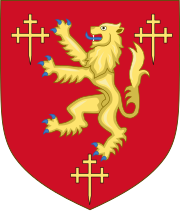
Back Hrabě z Essexu Czech Earl of Essex German Conde de Essex Spanish Comte d'Essex French Conte di Essex Italian エセックス伯 Japanese Jarl av Essex NB Hrabia Essex Polish Conde de Essex Portuguese Граф Эссекс Russian
This article includes a list of general references, but it lacks sufficient corresponding inline citations. (April 2019) |
| Earldom of Essex | |
|---|---|
  Arms of Capell, Earl of Essex: Gules, a lion rampant, between three cross crosslets fitcheeé or[1] | |
| Creation date | 1139 (first creation) 1199 (second creation) 1239 (third creation) 1376 (fourth creation) 1461 (fifth creation) 1540 (sixth creation) 1543 (forfeit 1553–59) (seventh creation) 1572 (eighth creation) 1661 (ninth creation) |
| Created by | Stephen (first creation) John (second creation) Henry III (third creation) Edward III (fourth creation) Edward IV (fifth creation) Henry VIII (sixth creation) Henry VIII (seventh creation) Elizabeth I (seventh creation, restoration) Elizabeth I (eighth creation) Charles II (ninth creation) |
| Peerage | Peerage of England |
| First holder | Geoffrey de Mandeville, 1st Earl of Essex |
| Present holder | Paul Capell, 11th Earl of Essex (ninth creation) |
| Heir presumptive | William Jennings Capell |
| Subsidiary titles | Viscount Malden Baron Capell of Hadham |
| Former seat(s) | Cassiobury House |
| Motto | Fide et fortitudine (By faith and fortitude) |
Earl of Essex is a title in the Peerage of England which was first created in the 12th century by King Stephen of England. The title has been recreated eight times from its original inception, beginning with a new first Earl upon each new creation. The most well-known Earls of Essex were Thomas Cromwell (c. 1485 – 1540) (sixth creation), chief minister to King Henry VIII, Sir William Parr (1513-1571) who was brother to Queen Catherine Parr who was the sixth wife of King Henry VIII, and Robert Devereux, 2nd Earl of Essex (1565–1601) (eighth creation), a favourite of Queen Elizabeth I who led Essex's Rebellion in 1601.
The current holder of the earldom is Paul Capell, 11th Earl of Essex (born 1944), a retired school teacher from Caton, Lancashire.[2]
The family seat was Cassiobury House, near Watford, Hertfordshire.
- ^ Montague-Smith, P.W. (ed.), Debrett's Peerage, Baronetage, Knightage and Companionage, Kelly's Directories Ltd, Kingston-upon-Thames, 1968, p. 430
- ^ Bunyan, Nigel; Fenton, Ben (18 June 2005). "New Earl of Essex is ever so humble". The Daily Telegraph. London. Retrieved 3 January 2015.